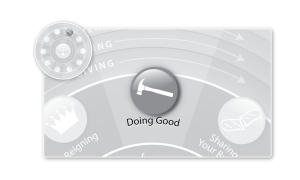Part I of our series on Doing Good
Sometimes it is to make others (or themselves) feel good. Often, it is to try to become a better person. And, of course, some do so to try to make the world a better place.
But no one does good for the specific purpose of benefiting one’s enemies. Yet, benefiting one’s enemies—lavishly and intentionally—is the massive and immovable cornerstone of Jesus’ own program of doing good:
“But I tell you who hear me: Love your enemies, do good to those who hate you, bless those who curse you, pray for those who mistreat you. If someone strikes you on one cheek, turn to him the other also. If someone takes your cloak, do not stop him from taking your tunic. Give to everyone who asks you, and if anyone takes what belongs to you, do not demand it back. Do to others as you would have them do to you.
“If you love those who love you, what credit is that to you? Even ‘sinners’ love those who love them. And if you do good to those who are good to you, what credit is that to you? Even ‘sinners’ do that. And if you lend to those from whom you expect repayment, what credit is that to you? Even ‘sinners’ lend to ‘sinners,’ expecting to be repaid in full. But love your enemies, do good to them, and lend to them without expecting to get anything back. (Luke 6:27–35)
It would not be the least bit presumptuous to sum up Jesus’ entire earthly mission as a salvific program of “doing good to the enemies of God.”
The apostle Paul explains:
“At just the right time, when we were still powerless, Christ died for the ungodly. Very rarely will anyone die for a righteous man, though for a good man someone might possibly dare to die. But God demonstrates his own love for us in this: While we were still sinners, Christ died for us.” (Romans 5:6–8)
Jesus tells his followers that they have only one reason to do good: to mirror the character of his Father into the world. Here is how Jesus concludes the Matthew 6 passage on doing good to one’s enemies:
“Then your reward will be great, and you will be sons of the Most High, because he is kind to the ungrateful and wicked. Be merciful, just as your Father is merciful.” (Luke 6:35–36)
In order to understand Jesus’ approach to doing good, we need to see that there are two huge differences between the way the world looks at good and evil and how God does.
The First Difference
According to the world, there are good actions and there are evil actions, but most actions are basically neutral. The idea is that most of the time we are just living life, doing neutral things, and then every so often a situation comes up where we have to choose whether to do something good or something evil; both of which require about the same amount of effort.
In other words, the world seems to believe it’s hard to be evil unless you really mean to be. Most of the time we are basically average people, neither good nor evil, but we are capable of doing good when the right situation comes up.
The Bible does not recognize these three categories of good, neutral, and evil. Instead, it recognizes only two: good and evil. If one is not doing good, then one must be doing evil:
“Whoever of you loves life and desires to see many good days, keep your tongue from evil and your lips from speaking lies. Turn from evil and do good; seek peace and pursue it.” (Psalm 34:12–14)
Understanding this helps to make sense of Mark 3:4. Here, Jesus asks the Pharisees, “Which is lawful on the Sabbath: to do good or to do evil, to save life or to kill?”
The question is: what is one’s orientation toward others—good or evil?
He doesn’t give them the option of being neutral, even though the world says that’s what most of us are. What the world calls neutral the Bible calls evil. Why? Because doing the neutral thing of living as if you and your concerns are the central reality of your existence necessarily makes God second.
The word the Bible uses for that is “evil.”
Tune into our next post to learn about the second big difference.












Yes, no neutrality. Neutrality is a myth. To be neutral to Jesus Christ is to be His enemy. Jesus said, “Whoever is not with me is against me, and whoever does not gather with me scatters” (Matt 12:30, ESV). There you have it, we are either with God or we are against Him. There is no in-between.
Well put, Val!
Pingback: Christian Morality is Not a Sliding Scale | Rev. Eric Foley